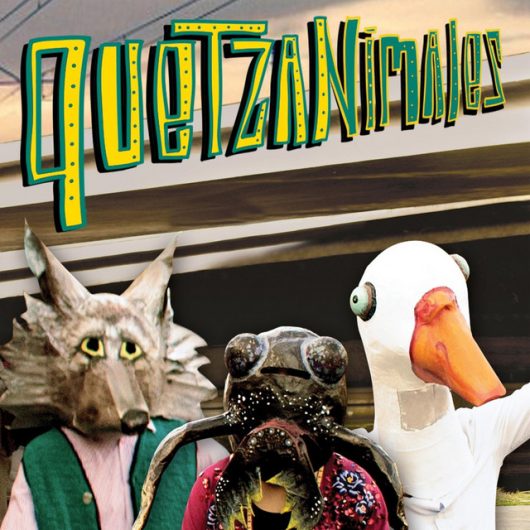Record Tracklist
Come and listen to the world made by the band’s latest album Quetzanimales. In “Intro (Sun Rises Over The East Side),” the steady note of Peter Jacobson’s cello stretches our bodies open toward the urban-scape configuring a sense of equilibrium among the worldly matter that is suspended and released throughout our planet. In this, their sixth album release Quetzal turns to the matter of animals in urban space—including roosters, ants, owls, geese, squirrels, coyotes, pigeons, spiders, dogs, and butterflies—to imagine a world not merely from the animal’s perspective but that shatters the colonial distinctions between persons, things, and animals. The animals in Quetzanimales come to life through the sounds of funky cumbia beats, bluesy melodies, and country inflected soulful ballads.
Quetzanimales is situated at the intersection of space, human life, and animal existence, thereby channeling the spirit of a world Gloria Anzáldua once theorized as “un mundo surdo” (a left-handed world) which she intentionally spelled with an “s” to symbolize the radical power held in thinking and imagining wrongly, in other words, refusing to accept our world as it is. Quetzanimales creates un mundo surdo, a world cultivated through souls thriving and surviving that offer teachings that may allow us to recover our own souls. Quetzanimales offers us what feminist theorists would call a “posthuman” praxis for appreciating the offerings of the rooster’s awakenings and the coyote’s hunger. Such offerings assembled in this album call us to imagine life relationally across different beings rather than across the same beings. As Martha Gonzalez explains, the project configures “an animal world that can give us insight into our own humanity.”
Strategies for endurance and persistence are the knowledges passed to us by the ballad “Hormiguitas Divinas,” (Divine Little Ants) who perform a steadfast stride of meticulous labor in light of a courage understood merely in vain. “Sin embargo amanece con las fuerzas en mano / Y aunque alguien vea su esfuerzo en vano / Como hormiga sigue el valor para / Su futuro hermano.” If the hormiguitas divinas provide models of self-preservation within a world built through exploitation, the upbeat Smiths inspired “Perro Caliente” (Dog In Heat) reminds us that radical imaginaries of being must never lose sight of the power of play and eroticism within bodily flesh. The “panting, begging eyes” and “gyrating thighs” of the horny dog in heat calls to mind the vast dimensions of anticipation that strengthen our spirits to desire beyond what is now. The visceral is powerful knowledge. The bossa nova influenced “Ardilla” (Squirrel) sings of the squirrel’s happiness as the moment of gratification. While the ardilla does indeed want to accumulate— “store, store, store…I want more, more, more”— hers is an abundance measured by need rather than greed. The squirrel’s ideal of happiness is based on being “content with my content”; It opts to fill its home with “health and happiness” thereby disrupting the relationship between possession and power. In “Spider’s Lament,” Gonzalez sings, “La araña rodeaba a su preso, un peso y lamento / En el corazón / Tela- tela telaraña / Que la lluvia baja y baña.” Lyrics such as these exemplify the relational affiliation Gonzalez maintains with the animals throughout this album, having personified them during much of her writing process. The song and writing process, in fact, arches back to Anzáldua’s 2002 poem “Like a spider in her web,” where she describes her writing process through the interpretation of a spider. “To keep out the world / I burrow under blankets / And like a spider in her web / Spin images and words / Fashioning another kingdom.”
In a similar spirit, this album fashions a splendid world for us to listen to, encouraging us to pursue an equilibrium that honors all living matter. Quetzanimales sounds a possibility of un mundo surdo through alternative practices and models of gratification, endurance, and perseverance gifted to our souls by all living beings.
Written by Deborah R. Vargas, Associate Professor, Department of Ethnic Studies at The University of California, Riverside. She is the author of Dissonant Divas in Chicana Music: The Limits of La Onda (University of Minnesota Press, 2012).
